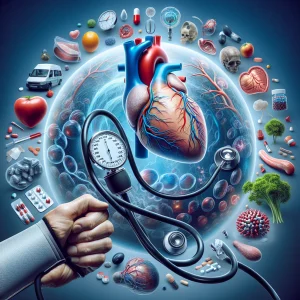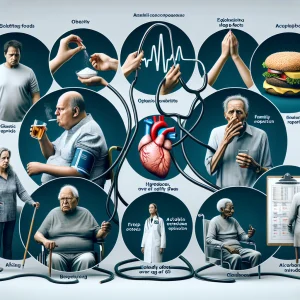Understanding High Blood Pressure: The Silent Killer and Its Impact on Health
High blood pressure, often termed hypertension, is a widespread health issue that affects millions of adults worldwide. The troubling aspect is that many people are unaware they have this condition, as it usually does not present any noticeable symptoms. This stealthy nature of hypertension earns it the moniker of a silent killer since it can lead to critical health complications, including heart disease and stroke, if left untreated. Regular screening for hypertension is essential for early detection and effective management, helping to keep your blood pressure within a healthy range and reducing the risk of severe health outcomes.
Implementing small yet impactful lifestyle changes can significantly enhance your ability to manage blood pressure. Simple modifications, such as embracing a nutritious diet filled with colorful fruits, leafy vegetables, and whole grains, alongside ensuring adequate quality sleep, can make a remarkable difference in maintaining blood pressure within safe limits. These adjustments not only contribute to better cardiovascular health but also promote your overall well-being and vitality, allowing you to lead a more active and fulfilling life.
 Comprehensive Overview of Blood Pressure: Importance and Measurement Techniques
Comprehensive Overview of Blood Pressure: Importance and Measurement Techniques
Blood pressure refers to the force that circulating blood exerts against the walls of blood vessels, primarily influenced by the heart’s pumping action. This measure is critical as it indicates how effectively blood circulates throughout your body and the resistance it meets while navigating through arteries. Maintaining optimal blood pressure levels is crucial for overall health, as elevated blood pressure can lead to severe health issues. Understanding how to measure and interpret blood pressure readings is vital for recognizing potential health risks.
Blood pressure is measured in millimeters of mercury (mmHg) and consists of two primary figures:
- Systolic Pressure – This is the first number, indicating the pressure in your arteries when the heart beats and actively pumps blood.
- Diastolic Pressure – This is the second number, representing the pressure in your arteries when the heart is at rest between beats.
For example, a reading of 120/80 mmHg indicates a systolic pressure of 120 and a diastolic pressure of 80, which is generally considered a normal and healthy blood pressure level.
Exploring the Causes and Risks Associated with High Blood Pressure
High blood pressure can develop due to a variety of factors, often linked to the narrowing of arteries that increases resistance to blood flow. This increased resistance can elevate blood pressure levels, putting substantial strain on vital organs such as the kidneys, heart, brain, and eyes. Over time, untreated hypertension can lead to severe health complications, particularly cardiovascular diseases, which may impact quality of life and longevity.
Blood pressure can fluctuate for various reasons, and healthcare professionals categorize readings according to established guidelines:
Low blood pressure – 90/60 mmHg or lower
Normal blood pressure – Ranges from 90/60 mmHg to 120/80 mmHg
High blood pressure – 140/90 mmHg or higher
A reading between 120/80 mmHg and 140/90 mmHg indicates potential risks for developing hypertension in the future. It is essential to consult with a healthcare provider to understand your individual blood pressure norms, as they can vary based on several factors.
 Diving into the Key Causes of High Blood Pressure: Risk Factors You Should Know
Diving into the Key Causes of High Blood Pressure: Risk Factors You Should Know
While high blood pressure does not stem from a single source, multiple risk factors can contribute to its development. Important factors include:
- Being overweight or obese
- Smoking
- Consuming a high-salt diet
- A family history of hypertension
- Excessive alcohol consumption
- Lack of sleep
- Inadequate physical activity
- Aging, particularly over 65
- Being of Caribbean or African descent
Many of these risk factors can be modified through lifestyle changes. In rare cases, high blood pressure may be linked to underlying medical conditions or specific medications, affecting approximately 1 in 20 individuals. Such conditions may include:
- Thyroid disorders
- Kidney diseases
- Diabetes
- Use of steroids
- Hormonal contraceptives
- Recreational drugs, such as cocaine
Recognizing the Hidden Symptoms of High Blood Pressure: Awareness and Testing
One of the most significant challenges of hypertension is that it often develops without any apparent symptoms, causing many individuals to remain unaware of their condition. In the UK, approximately 25% of adults are estimated to have undiagnosed high blood pressure. The most reliable method to ascertain your blood pressure status is through regular testing.
You can have your blood pressure measured at various locations, including:
- Your GP’s office or with a healthcare professional – simply request a blood pressure check.
- Many local pharmacies offer blood pressure monitoring services.
- Some workplaces provide health screenings that include blood pressure checks.
- At home, utilizing a personal blood pressure monitor for convenience and regular monitoring.
 Proven Strategies for Effectively Lowering Your Blood Pressure and Enhancing Health
Proven Strategies for Effectively Lowering Your Blood Pressure and Enhancing Health
Since lifestyle choices play a significant role in the development of high blood pressure, making informed changes can help mitigate your risk. Here are four vital strategies you can implement:
Commit to Regular Physical Activity for Optimal Heart Health
Incorporating regular exercise into your daily routine is essential for maintaining the overall health of your heart and blood vessels, which ultimately aids in lowering blood pressure levels. Carrying excess weight puts additional strain on your heart, forcing it to work harder to circulate blood effectively. By engaging in regular physical activity, you can achieve weight loss and enhance your cardiovascular fitness, both of which are crucial for lowering blood pressure and improving your overall health and well-being.
Emphasize a Heart-Healthy Diet for Blood Pressure Control
Focusing on a well-balanced diet that highlights whole foods, including a variety of fruits, vegetables, and lean proteins, can significantly contribute to lower blood pressure levels. Since salt has been shown to increase blood pressure, reducing your sodium intake is imperative. The NHS recommends limiting salt to less than 6g per day, roughly equivalent to one teaspoon. By decreasing the consumption of processed foods high in salt and utilizing herbs and spices to flavor your meals, you can create delicious dishes while supporting your heart health.
Moderate Alcohol Consumption for Better Blood Pressure Management
Limiting both the amount and frequency of alcohol intake can significantly influence blood pressure levels. Incorporating alcohol-free days into your weekly routine and spacing out drinking days can be beneficial for your health. Although the NHS advises a maximum of 14 units of alcohol per week—equivalent to about 7 pints of 4% ABV beer or 7 glasses of 175ml wine—it’s important to note that you do not need to reach this limit consistently.
Prioritize Quality Sleep for Overall Health and Blood Pressure Regulation
Consistently poor sleep can elevate the risk of developing high blood pressure. The NHS suggests aiming for 6 to 9 hours of restful sleep each night to support your overall health and maintain appropriate blood pressure levels. Establishing a calming bedtime routine and creating an environment conducive to sleep can significantly improve your sleep quality, thereby supporting your heart health and overall well-being.
Presented By: Private Blood Pressure Tests
The Article Blood Pressure Test Explained: What You Need to Know Was Found On https://limitsofstrategy.com

